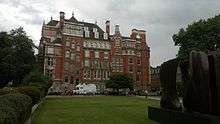Church Commissioners

The Church Commissioners is a body managing the historic property assets of the Church of England. It was set up in 1948 combining the assets of Queen Anne's Bounty, a fund dating from 1704 for the relief of poor clergy, and of the Ecclesiastical Commissioners formed in 1836.
The Church Building Act 1818 granted money and established the Church Building Commission to build churches in the cities of the Industrial Revolution. These churches became known variously as Commissioners' churches, Waterloo churches or Million Act churches. The Church Building Commission became the Ecclesiastical Commissioners in 1836.
An earlier Ecclesiastical Duties and Revenues Commission had been set up under the first brief administration of Sir Robert Peel in 1835 with a wide remit, "to consider the State of the Established Church in England and Wales, with reference to Ecclesiastical Duties and Revenues" (Minutes of the Commission, 9/2/1835); this body redistributed wealth between the dioceses and changed diocesan boundaries, and the permanent Ecclesiastical Commission was formed the following year.
The value of the commissioners' assets was around £5.5 billion as at the end of 2012.[1] By September 2016, it was valued at £7 billion.[2] Most of the income is used to pay clergy pensions.
The commissioners also oversee pastoral reorganisation, the consent of the commissioners being required for establishing or dissolving team and group ministries, uniting, creating, or dissolving benefices and parishes, and the closing of consecrated church buildings and graveyards.
The Church Commissioners are now based at Church House, Westminster, London, having long occupied No. 1 Millbank.[3] However, the Millbank building was sold in 2005 to the House of Lords for accommodation of members and staff; the commissioners completed the move to Church House in 2007.[4] They used to be an exempt charity under English law.[5]
The Secretary (and chief executive) of the Church Commissioners is Andrew Brown.[6]
Composition
The 33 commissioners are as follows:[7][8]
- The Archbishop of Canterbury (Justin Welby), chair ex officio[9]
- The Archbishop of York (John Sentamu)
- The First Church Estates Commissioner (Loretta Minghella), who is appointed by the Queen and who represents the Church Commissioners in the General Synod
- The Second Church Estates Commissioner (Dame Caroline Spelman), who is a Member of Parliament appointed by the Queen and who represents the Church Commissioners in the General Synod and answers to Parliament for the business of the commissioners
- The Third Church Estates Commissioner (Eve Poole), who is appointed by the Archbishop of Canterbury and who represents the Church Commissioners in the General Synod
- Four bishops elected by the House of Bishops from among their number (David Urquhart, Christine Hardman, Martin Warner, and David Walker)
- Two deans elected by the deans (Jonathan Greener and Stephen Lake)
- Three clergypeople elected by those members of the House of Clergy who are not deans (Bob Baker, Christopher Smith, and Stephen Trott)
- Four laypeople elected by the House of Laity (April Alexander, Peter Bruinvels, Gavin Oldham, and Jacob Vince)
- Three members nominated by the Crown (Suzanne Avery, The Lord Best, and Duncan Owen)
- Three members nominated by the Archbishops of Canterbury and York acting jointly (William Featherby, Jeremy Clack, and Mark Woolley)
- Three members nominated by the Archbishops of Canterbury and York acting jointly after consultation with the Lord Mayors of the Cities of London and York, the Vice Chancellors of the Universities of Oxford and Cambridge, and others (Hywel Rees-Jones, Poppy Allonby, and Graham Oldroyd)
- The First Lord of the Treasury (Theresa May)
- The Lord President of the Council (Andrea Leadsom)
- The Lord Chancellor (David Gauke)
- The Secretary of State for Culture, Media and Sport (Jeremy Wright)
- The Speaker of the House of Commons (John Bercow)
- The Lord Speaker (The Lord Fowler)
The Board of Governors is composed of all of the commissioners apart from the First Lord of the Treasury, the Lord President of the Council, the Lord Chancellor, the Secretary of State for Culture, Media and Sport, the Speaker of the House of Commons, and the Lord Speaker.[7]
See also
References
- ↑ "Church Commissioners - The Church of England". www.cofe.anglican.org.
- ↑ "Sir Andreas Whittam Smith to step down from Church Commissioners". Media Centre. Church of England. 29 September 2016. Retrieved 21 May 2017.
- ↑ Historic England. "Details from image database (418227)". Images of England. Retrieved 20 April 2015.
- ↑ "Church Commissioners complete sale of Millbank site". www.churchofengland.org. The Church of England. 29 March 2005. Retrieved 17 August 2015.
- ↑ "Exempt charities". GOV.UK.
- ↑ "About the Church Commissioners: Staff". Church of England. Retrieved 26 March 2018.
- 1 2 "Church Commissioners Measure 1947". www.legislation.gov.uk.
- ↑ "About the Church Commissioners: Trustees". Church of England. Retrieved 26 March 2018.
- ↑ "Archived copy". Archived from the original on 2014-02-02. Retrieved 2014-01-28.
External links
- The Church Commissioners
- Church Commissioners Measure 1947 at the UK Statute Law Database
- Church Commissioners Measure 1970 at the UK Statute Law Database